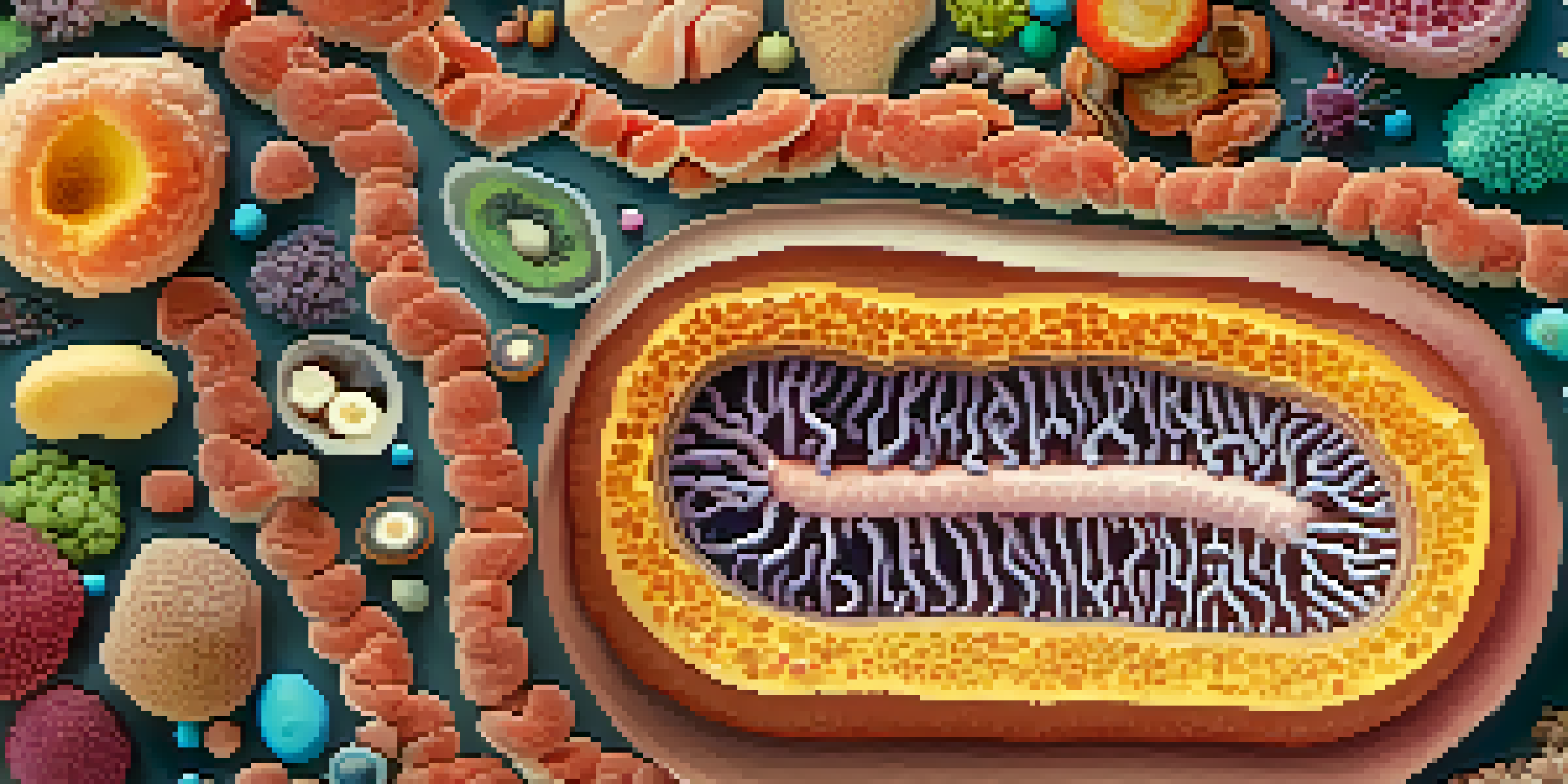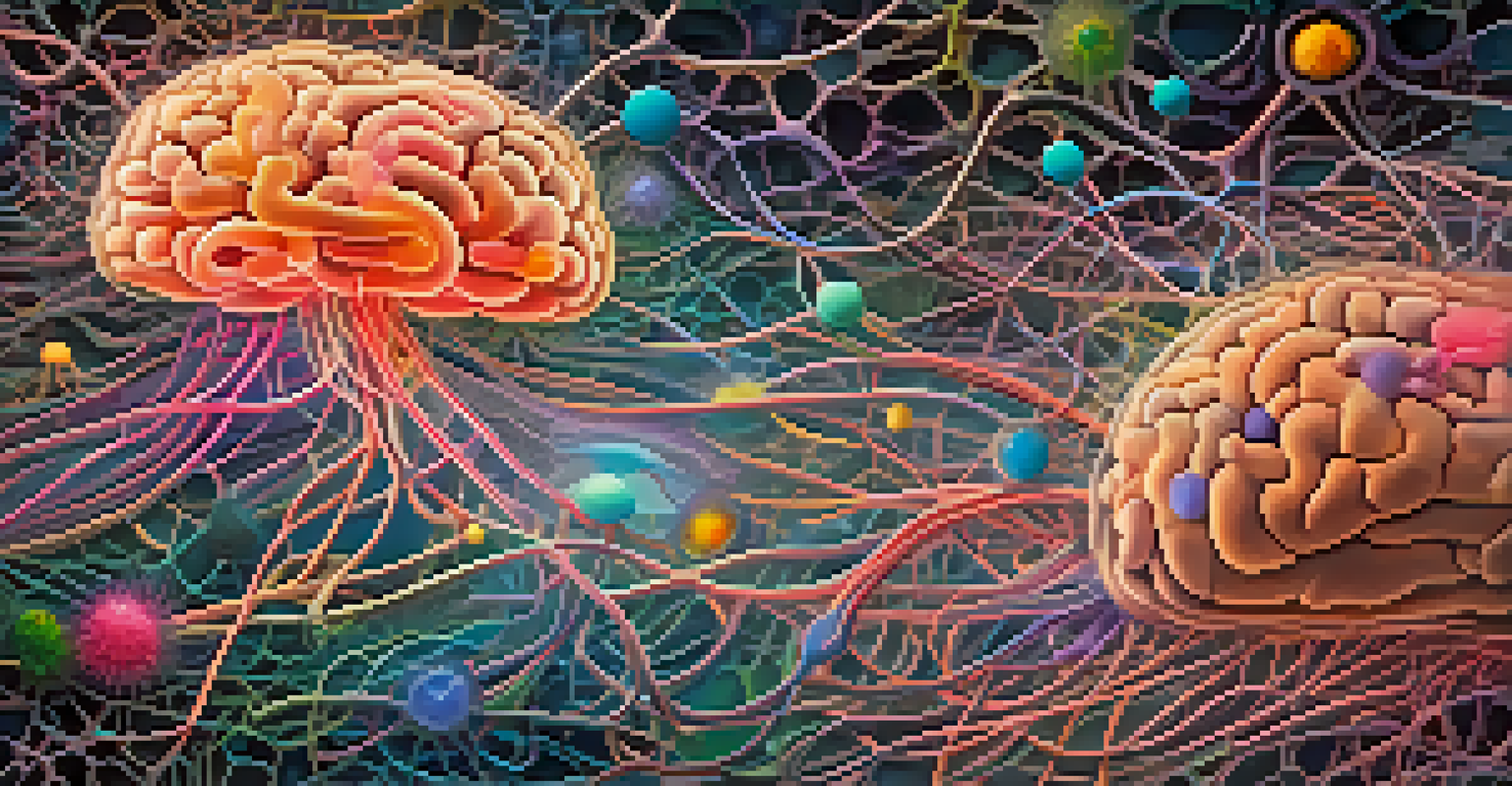Understanding Gut Microbiome Mapping: A New Frontier

What is the Gut Microbiome and Why Does It Matter?
The gut microbiome refers to the trillions of microorganisms living in our digestive system. This diverse community includes bacteria, viruses, fungi, and even protozoa that play a crucial role in our overall health. They help with digestion, synthesize vitamins, and even influence our immune system, making their well-being essential.
The gut microbiome is a complex ecosystem that plays a crucial role in our overall health.
Think of the gut microbiome as a bustling city where different neighborhoods serve various functions. Some areas might focus on breaking down food, while others are dedicated to fighting off harmful pathogens. When the balance is disrupted, it can lead to health issues like obesity, diabetes, or gastrointestinal disorders.
Understanding this intricate ecosystem can open new pathways in medicine and nutrition. Researchers are now exploring how mapping these microbial communities can provide insights into personalized healthcare, potentially revolutionizing the way we approach treatment and wellness.
The Science Behind Microbiome Mapping
Microbiome mapping involves analyzing the DNA of the microorganisms in our gut. By sequencing this genetic material, scientists can identify which species are present, their relative abundance, and how they interact with one another. This process provides a detailed snapshot of an individual's microbiome.

Imagine taking a photograph of a colorful, intricate tapestry. Each thread represents a different microorganism, and their arrangement tells a story about the person's health. This mapping can reveal not only the current state of the microbiome but also how it has changed over time.
Microbiome's Role in Health
The gut microbiome is essential for digestion, immune function, and overall health, influencing various bodily systems.
With advancements in technology, microbiome mapping has become more accessible and affordable. Companies now offer at-home testing kits that allow individuals to gain insights into their gut health, paving the way for more personalized nutrition and lifestyle recommendations.
How Gut Microbiome Mapping Can Influence Diet
One of the most exciting applications of gut microbiome mapping is its potential to inform dietary choices. By understanding the specific microbes present in a person's gut, nutritionists can tailor dietary recommendations that promote a healthy balance. This could mean suggesting more fiber-rich foods or fermented products that foster beneficial bacteria.
Your gut microbiome is like a fingerprint; it’s unique to you and can influence your health in profound ways.
Consider your gut like a garden—different plants (or microbes) thrive under different conditions. Mapping helps identify which 'plants' need more nurturing and which ones might be overgrown. This personalized approach to diet can lead to improved digestion, enhanced energy levels, and even weight management.
As we continue to explore this frontier, we may see more people opting for personalized meal plans based on their unique microbiome profiles. This shift could transform not just individual health but also broader dietary trends and food production.
The Role of Gut Microbiome in Mental Health
Emerging research suggests a strong connection between gut health and mental well-being, often termed the 'gut-brain axis.' This means that the state of our gut microbiome can impact our mood, anxiety levels, and even cognitive function. Microorganisms in the gut produce neurotransmitters and short-chain fatty acids that influence brain health.
Imagine your gut as a communication hub sending messages to your brain. A balanced microbiome can ensure that these messages are clear and beneficial, while an imbalanced microbiome may lead to confusion and distress. This connection underscores the importance of maintaining gut health for overall mental wellness.
Personalized Diet Insights
Mapping the gut microbiome allows for tailored dietary recommendations that promote balance and improve health outcomes.
Microbiome mapping could play a crucial role in understanding these dynamics. By identifying specific microbial profiles associated with mental health conditions, researchers can develop targeted interventions aimed at restoring balance and improving emotional well-being.
Microbiome Mapping and Immune System Function
The gut microbiome is a key player in the immune system, helping to regulate immune responses and protect against infections. A diverse and balanced microbiome can enhance the body’s ability to fend off pathogens and reduce inflammation, which is crucial for overall health.
Think of your gut microbiome as a first line of defense, acting like a security team that monitors and reacts to threats. When the balance of this team is disrupted, it can lead to increased susceptibility to illnesses and chronic conditions. Microbiome mapping helps identify potential weaknesses in this lineup.
By understanding an individual's microbiome composition, healthcare providers can recommend specific probiotics or dietary changes aimed at strengthening immune function. This personalized approach may enhance the body’s resilience against diseases, illustrating the profound impact of gut health on our overall immunity.
Potential Challenges and Ethical Considerations
While the promise of microbiome mapping is exciting, it also comes with challenges and ethical considerations. Issues such as data privacy, the interpretation of results, and the potential for misapplication of findings must be carefully navigated. Consumers need to understand that microbiome data is complex and should be interpreted with caution.
For example, a certain microbial presence might be associated with a health issue, but it doesn’t necessarily mean it causes it. Just like a weather forecast, the information can indicate trends, but it doesn’t guarantee outcomes. Therefore, proper guidance from health professionals is essential.
Gut-Brain Connection Explained
Research shows a significant link between gut health and mental well-being, highlighting the importance of a balanced microbiome.
As the field evolves, establishing ethical guidelines for microbiome research and testing will be crucial. This ensures that individuals receive accurate information and support, fostering a responsible approach to embracing the potential benefits of microbiome mapping.
The Future of Gut Microbiome Mapping
As we stand on the brink of this new frontier, the future of gut microbiome mapping holds incredible possibilities. Advancements in artificial intelligence and machine learning could lead to more accurate interpretations of microbiome data, unlocking new insights into health management and disease prevention.
Imagine a world where doctors can predict health conditions based on an individual's microbiome profile, allowing for preventive measures tailored specifically to each person. This level of personalization could revolutionize healthcare, making it more proactive rather than reactive.

With ongoing research and increasing public interest, we can expect to see more developments in this field. As we uncover the complexities of our gut microbiome, we may find solutions to some of our most pressing health challenges, paving the way for a healthier future.